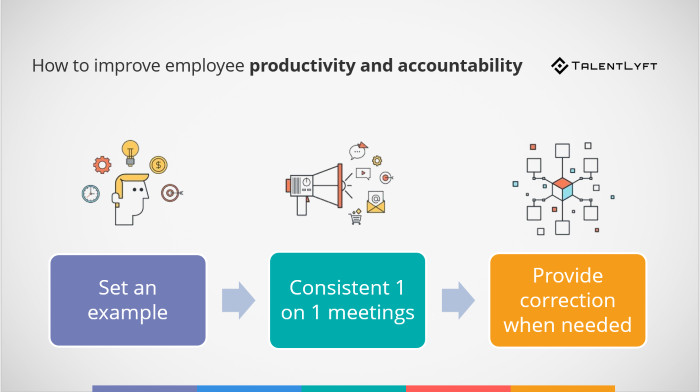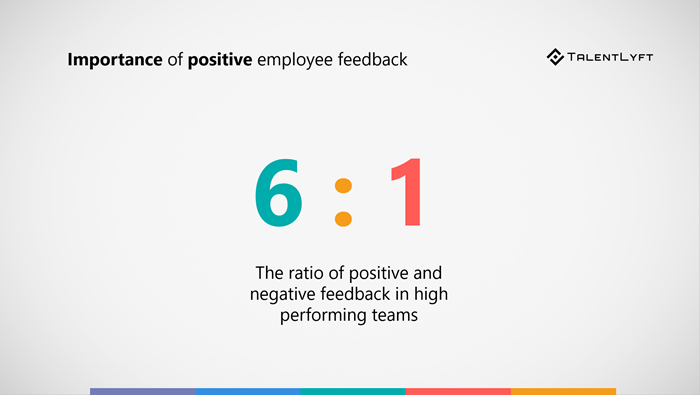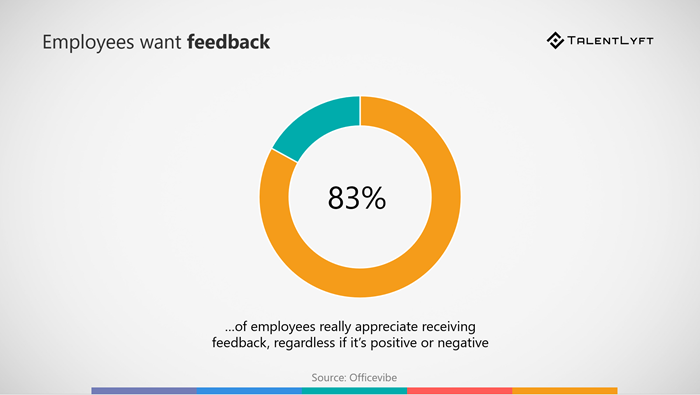
Are your team members missing deadlines? Or maybe there’s an attitude of apathy toward work among your employees? Learn 3 proven ways to encourage and improve employee productivity and accountability!
Are your team members missing deadlines? Or maybe there’s an attitude of apathy toward work among your employees? Learn 3 proven ways to encourage and improve employee productivity and accountability!
Are team members missing deadlines? Or maybe there’s an attitude of apathy toward work among your employees?
Encouraging employee productivity and accountability in the workplace can be a daunting task especially when the reasons for low productivity and unaccountability are varied.
Maybe you have an employee that is facing personal problems outside the workplace or perhaps the company made some changes in organization that are affecting one or more employees. Whatever the reason, there are ways to encourage improvement. Read on for ways managers can help.
➡️ Sign up for our 7 days email course: Short Leaderships Tips for Managers!
Here are the 3 proven ways managers can help improve employee productivity and accountability:

Managers have a unique influence on an employee’s productivity and accountability. While company owners, HR representatives and others can certainly play a role, managers know and work with their employees on a more consistent basis and consequently are more equipped to play a key role. One of the best ways managers can help their employees improve is to set the right example. Managers that are actively engaged in working toward team goals and in helping team members succeed can set a tone of productivity and accountability.
However, the opposite is true as well. Bosses who take credit for their employees work, don’t provide proper direction or who micromanage can take away an employee’s motivation to succeed. Finding the right balance between conducting their own work and helping those who work underneath them can be tricky for managers, but when accomplished can help in retaining employees and meeting company goals.
Beyond managing the employees, managers also set the tone for employee behavior at work which can influence their productivity and accountability. If a manager is constantly late to meetings or late showing up to work, don’t be surprised if their employees’ habits begin to mirror theirs. It’s hard to be present and engaged when the person in charge of leading you and your coworkers isn’t present or engaged either.
The same goes for owning up to mistakes and taking ownership of issues that arise. If a manager takes responsibility for a mishap or miscommunication, that can also encourage those who report them to do so as well - especially when a manager defends their team members and assumes responsibility when things go awry. Mistakes happen, owning up to those mistakes and working to make them right takes accountability to the next level.
When you examine the examples managers and other company leaders are setting, what do they say about the individual and their priorities? Looking at these answers can help managers know what attitudes and values they’re espousing and portraying to those who work under them. They can use that information to change their behavior and affect those around them in the process.
Annual reviews are common in many companies, but in a lot of instances, they don’t provide an accurate portrayal of an employee’s work and they don’t allow for constructive improvement.
Many employees, even good ones, come out of those once a year reviews feeling discouraged by negative feedback.

And, summing up an employee’s entire year in one meeting and assigning them a numeric classification as to their performance can be more damaging than not.
But there are ways to provide feedback in ways that are productive. Managers employing 1 on 1 meetings consistently can give constructive feedback on a regular basis. This feedback can inspire better accountability as employees will anticipate receiving it on a regular basis.
In fact, employees desire more frequent feedback.

But most report that despite a desire for more feedback, they don’t receive it. Educating managers on the importance of regular feedback to individual employees, as well as to the success of the team, can help them understand the importance of engaging in these types of informal reviews more often.
Holding annual reviews as part of these consistent 1 on 1 meetings could help employees set benchmark goals and be more productive throughout the year in reaching them. It might also be helpful to work with employees on smaller goals that contribute to bigger individual or team goals.
If feedback is given to employees regularly, then ideally correction won’t be needed as employees can use that feedback to make corrections themselves. However, sometimes due to miscommunications or other circumstances, correction may need to be given.
Managers should work with HR when providing correction to their employees for a couple reasons. First, it helps to have a third-party present to provide a more objective stance. When receiving criticism some employees may react poorly and managers may react to that. Having someone else there to help mediate if needed is helpful. Second, documentation of the correction can help if further action is needed later if an employee fails to improve their performance.
Giving correction can be a wakeup call for employees to take their work to the next level. When providing correction, try to be specific as possible in what you expect of the employee and what they can do to avoid further discipline. Give them actionable items to work on and a timeline in which improvement of productivity is expected. Then check in with them and work with them as they strive to make improvements. This will strengthen your working relationship and encourage the employee to put forth their best efforts in meeting your outlined expectations.
Managers may also choose to highlight a few areas of the employee’s work which is meeting expectations or exceeding them. Adding this positive information when delivering correction about other areas can help the employee not feel overly negative.
Whether you have a new employee who’s not performing at the expected level or a seasoned employee who needs a reminder, managers can employ these tactics to keep employees on track for success.
Managers who work hard and set an example of productivity and accountability can help employees do the same. When coupled with consistent 1 on 1 meetings and giving correction, managers can give their employees the tools they need to succeed in the workplace and achieve greater success.
Rachel Stones writes for the Built for Teams blog. Created specifically for small and medium sized businesses, Built for Teams is an intuitive HRIS system, providing HR managers and executives with critical employee data, reporting, org chart, and compliance information.
You can even schedule a demo to see how Built for Teams handles PTO tracking, time off approvals, org charts, recruiting, employee onboarding, and more. Created by the developers at Objective Inc.












